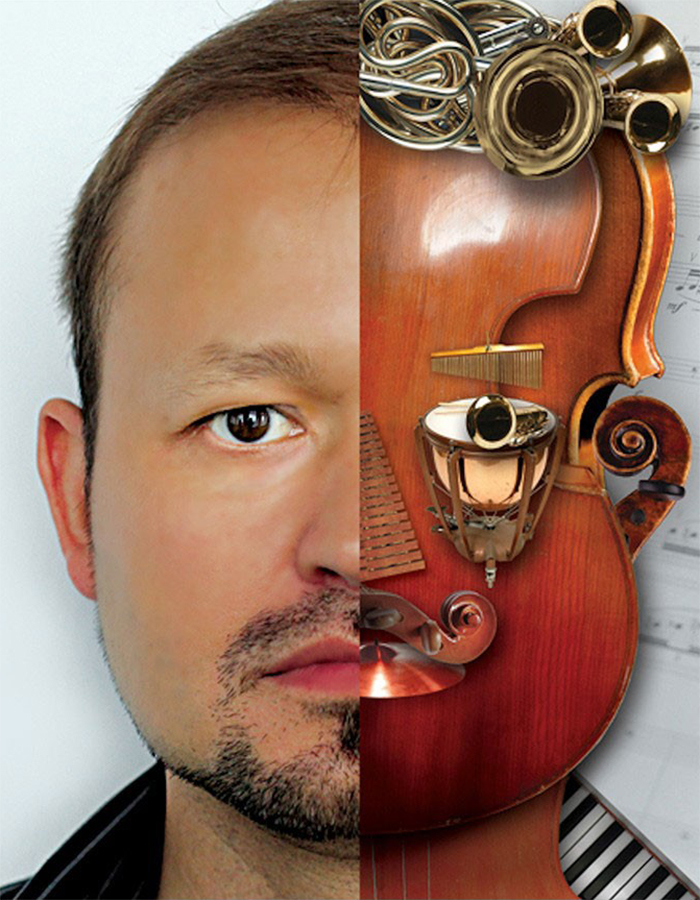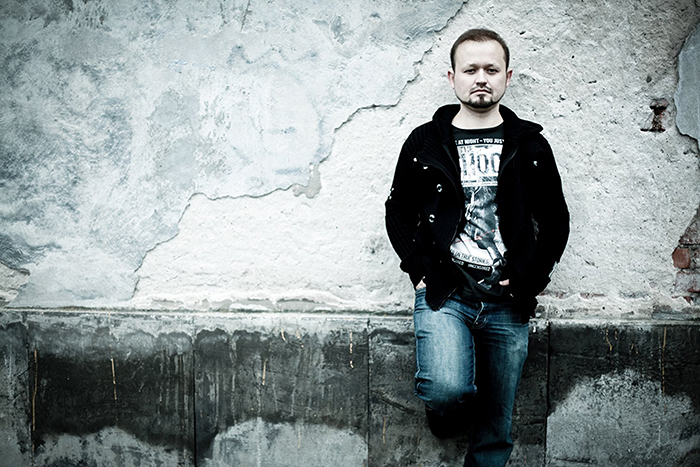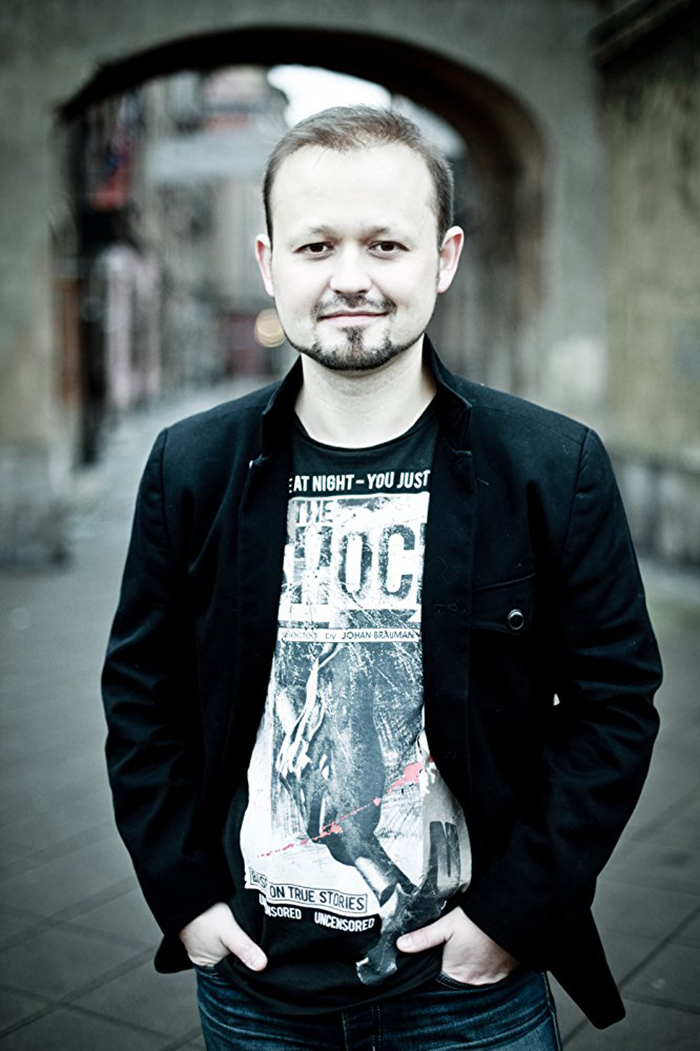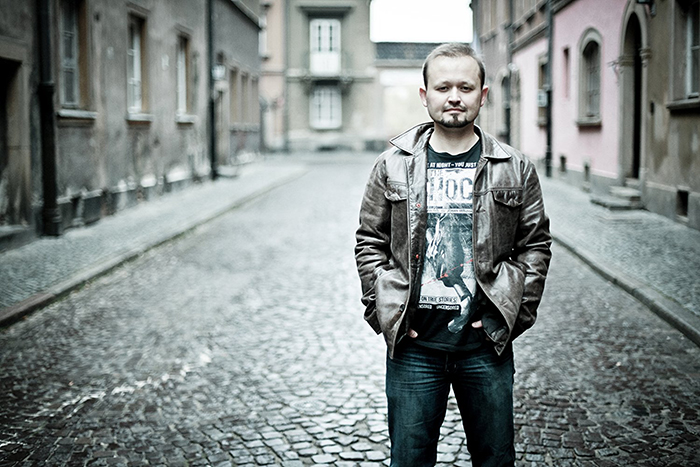Interview - Maciej Zielinski : Discover a great movie composer
By Mulder, Los Angeles, 26 february 2018

Q : Hello Maciej, please can you make a short presentation about your background before becoming a composer?
Maciej Zielinski : hello, It is hard to talk about my background “before becoming a composer” as I started to compose very early, even before primary music school. At the beginning I was improvising, trying to craft some melodies, add some simple harmonies on the piano. My father - Andrzej “Fats” Zielinski - was a famous jazz drummer in Poland. My family house was always full of famous Polish musicians. Some of them got international recognition, including Basia (Trzetrzelewska), Ula Dudziak, and Michal Urbaniak. My father used to record music to Roman Polanski’s early movies. He worked with Krzysztof Komeda the composer who has written music to Polanski’s “Rosemary’s Baby”. Thanks to that I could start gaining some musical experience in my early childhood. Later on I kept exploring many musical genres ranging between commercial to contemporary classical music. That is why I say “nothing musical is alien to me”.
Q : Which memory do you keep from your studies in Fryderyk Chopin University of Music in Warsaw, London Royal Academy of Music ? Why it is important for you to have a such background?
Maciej Zielinski : Thanks to my composition teachers at both schools - Marian Borkowski and Paul Patterson - I could develop my composer’s toolbox there and gain experience as a contemporary classical music composer. Contemporary classical music was not necessarily my main area of interest before I started my education at Warsaw Academy of Music, but thanks to lessons with Marian Borkowski (great Polish composer, studied at the Sorbonne University with Nadia Boulanger and Olivier Messiaen) I could explore new territories and widen my area of interest. This musical background helps me to compose film music without having any boundaries. I can combine different approaches to achieve original and unique results…e.g I love to combine acoustic instruments with electronic sources or advanced orchestral structures with more traditional melodic motives.
Q: You have an experience as an orchestrator, a composer and music supervisor, can you tell us more about these three different works ?
Maciej Zielinski : I am working mainly as a composer, but I also orchestrate all of my projects. I love to shape all of the parts on my own to get exactly what I want. I also work on the electronic parts as music technology is one of my biggest passions. Time to time I also work as an orchestrator, arranger or music producer. This type of work is very refreshing as I can add something to creative work done by the others. Great fun! Especially when working with talented artists!
Q: You have written scores for some of the biggest Polish blockbusters of recent years including Never Ever, Just Love Me and Crime Detectives. DESOLATION is currently out in limited release and a soundtrack will be released in tandem with the VOD release of the film in April. What can you tell us about your collaboration with the director David Moscow on this movie ?
Maciej Zielinski : I had to compose about 80 minutes of music for “Desolation”. It was twice as much as you would usually expect in 90 minutes movie. This was a lot of hard work but the collaboration went smoothly as we had great communication and understanding on both sides. We were both very excited to support the dramaturgy of the movie with the music. We worked mainly by Skype, so it was different approach than I usually use. This way of working has some advantages and disadvantages. I like to talk with the film director face-to-face, to spend some time together to better understand his/her thoughts, artistic goals, specific needs, etc. In this context Skype is definitely worse than meetings in the real world. On the good side - Skype sessions and remote work requires very clear communication. Working this way we were using tools like Google Docs to comment on specific cues. It helped to make all the remarks very concrete, which is not always the case working face-to-face. In the end we were both very happy with the efficiency of collaboration by Skype, but I have to admit that we also had two meetings in real world...

Q: What must be for you a great collaboration between a director and composer ?
Maciej Zielinski : When I start working on a project I need to understand well what director wants to achieve. Effective communication, good understanding, and good relationship between the director and composer helps a lot! I like when the director has clear vision and I can help with my music to send the message he/she wants to communicate. Sometimes the vision is not that clear at the beginning, especially in artistic projects. I have enormous pleasure in searching for something new, meaningful, discovering the right direction for the score using collaborative approach. Sometimes there is need to leave comfort zone to explore unknown territories. That is how we grow artistically, so I like to do that a lot. From my perspective it is not important if the director has some knowledge about music, but it helps when he/she has some musical sensitivity.
Q: What is for you the main duty of a good composer?
Maciej Zielinski : The main duty of a film composer is to understand film director’s vision, his/her needs and translate them into music. The film composer needs to find a way to support a movie with appropriate and adequate music. The main duty of a composer as an independent artist is to follow their own, original ideas and compose unique, original music. With my concert music I usually try to find the right balance between 3 main goals. I compose music, which I would like to listen to, music that performers would like to perform, and music that an audience would like to listen to.
Q: What must be for you the purpose of a great score and how do you found a powerful inspiration to create this music?
Maciej Zielinski : I believe that great film score is the one, which supports best the movie, makes it better and helps to communicate the message that the film director wants to send. It can tell a story, support the dramaturgy and emotions, and it can help to build the atmosphere. What is exactly its purpose depends on the movie, and on the director’s needs. The best scores usually work well for the movie as well as an autonomic musical experience. My main inspirations for the film scores come from the movies themselves. When I watch a movie for the first time my brain starts to produce some music or I feel some “musical moods”… Then I am trying to follow it, catch some interesting ideas and transform them into music, which would support the movie in a right way.
Q: What is for you the main difficulties that you have met during the creation of the Desolation score?
Maciej Zielinski : The work on ‘Desolation’ went pretty smoothly. Challenging element I can recall it was the length of the score – 80 minutes. Usually I am working on shorter scores, about 40 minutes long, so this time the work was much more intense. Also the use of Yaybahar, a very unique Turkish instrument, was challenging as I had to learn about the instrument and its specifics first. Working on the script David was listening to some of Yaybahar’s youtube videos, so he asked me if we could use it in the score. I knew the instrument from a concert in Cracow I attended one year before. I was sure it would be great to use it to produce original sonic environment for mysterious block of apartments, which was very important for the plot. Gorkem Sen, the musician and Yaybahar’s inventor accepted our invitation to perform the music to “Desolation” and thanks to his amazing sound we could achieve something very original, one of its kind. Part of the material came from Gorkem’s improvisations. I had to explain him what I want to achieve first, and then he was improvising to follow my requests. We’ve recorded many takes and then I had to go through the materials to pick, edit and combine the best parts. This was sometimes challenging but also fun to do. There is just one unit of Yaybahar that exists, so we were thrilled to work with such an extremely unique instrument.

Q: On which software do you like to work and which instrument is your favorite and why?
Maciej Zielinski : I am working on Cubase. This is the main Digital Audio Workstation I use since its birth more than 25 years ago. I also use ProTools as this is industry standard tool used in most recording studios and I need it in my workflow. At the end of my composition work - before recording sessions – we need to transfer all the tracks from Cubase to ProTools, so they could be used in a recording studio. I also use many virtual instruments. Most of them work with Native Instruments Kontakt sampler, so this is my main instrument to go. Also Spectrasonic’s Omnisphere is my favorite instrument. I use many great VSTI plugins and Kontakt libraries developed by Native Instruments, Steinberg, 8DIO, Spitfire Audio, East and West, Output, Heavyocity, Sample Logic, Spectrasonics and many others. The most recent instruments offer amazing sounds together with nicely done editing features. It is easy to produce unique and original sounds. If you are creative and you know what you want to achieve you can create your music much faster and easier than ever before.
Q: Will you be interested to work with French directors?
Maciej Zielinski : French cinema and French filmmakers have very strong tradition. I love movies made by so many French masters including Jean-Luc Godard, Jean Cocteau, Francois Truffaut, Louis Malle, and Jean Renoir. I also like movies made by more recent French directors like e.g. Jean-Pierre Jeunet or Luc Besson. Talking about French filmmakers I also need to mention a movie “Adrenaline” directed by many French directors. I watched it at a festival in Warsaw probably around 1990. This was set of short a bit surreal, unique movies. I was very impressed with it. I remember that it made me think that it would be amazing to work with French directors. When I am working with filmmakers from other countries I am usually learning something new, I gain new experience. This is sort of intellectual exchange, which can enrich both sides artistically and help to achieve more interesting results. I can only imagine that collaboration with somebody from France, country with such a strong cinematic scene would be extremely interesting artistically and intellectually stimulating. I am definitely looking forward to that!
Q: Can you talk at all about your recent projects?
Maciej Zielinski : I usually don’t talk too much about my recent or future projects but I will make an exception for you. I am just about to finish the works on very interesting, independent American project. This is a movie with working title “Titus” dir. by Diana Zuros. She is LA-based Georgian film director. The movie tells a story of a difficult relationship between two women. One of them is deaf so they using sign language - there is almost no ordinary dialog in the movie. This leaves a lot of space for the music. The score is pretty unique as I am using only cello and electronics. I love cello as it can present full spectrum of emotions in a very distinct way. It is hard to reach this level of expressiveness with any other instrument. I am really happy with the result we’ve achieved. The movie should be released before the end of this year or at the beginning of 2019.

Filmography:
2017 – “Desolation” dir. by David Moscow
2017 – “With rhythm of the heartbeat” dir. by Piotr Were?niak
2017 – “Just Friendship” dir. by Filip Zylber
2016 – “Alaska is a drag” dir. by Shaz Bennett
2016 – “The Tale of Old Miller” dir. by Pavel Grytsak
2016 – “Humble servants” dir. by Mariusz Gawrys
2015 – ”Natureland” dir. by Malcolm Murray
2015 – “Sucked in” dir. by Piotr Weresniak
2015 – ”Put the siren on” dir. by Leszek Korusiewicz
2014 – ”Photographer” dir. by Waldemar Krzystek
2011 – ”Oh, Charles 2” dir. by Piotr Weresniak
2010 – ”Baby Project” dir. by Adam Dobrzycki
2008 – ”It is not as you think, Honey” dir. by Slawomir Krynski
2008 – ”Agents” dir. by Piotr Weresniak (TV Series)
2008 – ”Darling, don't lie” dir. by Piotr Weresniak
2008 – ”Once again” dir. by Mariusz Malec
2007 – ”Why not!” dir. by Ryszard Zatorski
2007 – ”Shades of happiness” dir. by Natalia Koryncka(TV Series)
2006 – ”Stuntmen” dir. by Marcin Ziebinski
2006 – ”Just love me” dir. by Ryszard Zatorski
2004 – ”Crime detectives” dir. by Ryszard Zatorski (TV Series)
2004 – ”Never ever” dir. by Ryszard Zatorski
2000 – ”A very Christmas story” dir. by Dariusz Zawislak
1997 – ”Germans” dir. by Zbigniew Kaminski
1996 – ”Street games” dir. by Krzysztof Krauze
Website : http://polishcomposer.com
Photos : Copyright Marta Filipczyk
We sincerely thank Maciej Zielinski for answering our questions
An huge thanks to Beth Krakower for helping us to have this great interview

